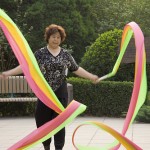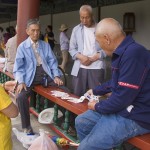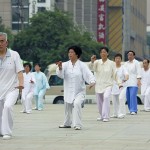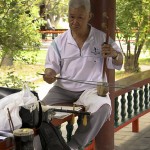 I think it was Brent Shea from Sweetbriar College, who uttered these words. At the time, if I remember correctly, we were walking through the garden outside the Temple of Heaven in Beijing. We passed through scores of groups of people, all likely over 55 years of age, each engaged in some activity. There were Go players, card players, and many different groups of singers and musicians (even one man with an accordion singing with a group, not far from a man playing a traditional erhu). They all seemed to be having a wonderful time. I marveled at the variety of activity on a weekday afternoon, and the obvious joy these people displayed. But I kept asking myself, “What’s going on here?” When we got a chance to talk to our tour guide, we found out that this garden is an informal meeting place for people who want to get together. They pay some nominal, annual fee and can visit as often as they like. They join groups to learn and play games, sing and dance, and socialize.
I think it was Brent Shea from Sweetbriar College, who uttered these words. At the time, if I remember correctly, we were walking through the garden outside the Temple of Heaven in Beijing. We passed through scores of groups of people, all likely over 55 years of age, each engaged in some activity. There were Go players, card players, and many different groups of singers and musicians (even one man with an accordion singing with a group, not far from a man playing a traditional erhu). They all seemed to be having a wonderful time. I marveled at the variety of activity on a weekday afternoon, and the obvious joy these people displayed. But I kept asking myself, “What’s going on here?” When we got a chance to talk to our tour guide, we found out that this garden is an informal meeting place for people who want to get together. They pay some nominal, annual fee and can visit as often as they like. They join groups to learn and play games, sing and dance, and socialize.
 The sociological relevance of this is the retirement age in China: 50 for women and 55 or 60 for men, depending on whether they were manual or non-manual workers. There seems to be a social obligation to retire, given that so many people are entering the work force. Once retired, they receive a government pension the size of which depends on their income, sort of like a graduated social security system. One rub is that farmers don’t get this pension, which makes the one-child policy particularly onerous for them. Another is that you only get the pension in the province in which your residency is registered.
The sociological relevance of this is the retirement age in China: 50 for women and 55 or 60 for men, depending on whether they were manual or non-manual workers. There seems to be a social obligation to retire, given that so many people are entering the work force. Once retired, they receive a government pension the size of which depends on their income, sort of like a graduated social security system. One rub is that farmers don’t get this pension, which makes the one-child policy particularly onerous for them. Another is that you only get the pension in the province in which your residency is registered.
The World Health Organization reports that the Chinese life expectancy at birth is 72/75 (m/f), and has been rising dramatically. My guess is that there is a significant rural-urban difference, which would mean the urban population would be living longer.  So retirement ages of 50-60 translate to 20-35 years of post-employment life. These years of retirement are longer than those in the US, where we retire at 65 and can expect to live into our late 70s. Furthermore, given the one-child and residency policies, these seniors may be quite unencumbered with other obligations. Nevertheless, a young, healthy retirement with lots of free time and a culture that rewards traditional activities makes for a very nice period in the last decades of life. Hence the garden scene at the Temple of Heaven.
So retirement ages of 50-60 translate to 20-35 years of post-employment life. These years of retirement are longer than those in the US, where we retire at 65 and can expect to live into our late 70s. Furthermore, given the one-child and residency policies, these seniors may be quite unencumbered with other obligations. Nevertheless, a young, healthy retirement with lots of free time and a culture that rewards traditional activities makes for a very nice period in the last decades of life. Hence the garden scene at the Temple of Heaven.
I thought of this scene throughout the trip, especially when I would wake up early to walk the streets around our hotels before breakfast. In both Beijing and Xi’an, the gardens and squares were busy with the activity of older people.  In both cities I saw several groups of men and women doing tai chi in groups or singly, often with traditional swords or banners. In Xi’an, traditional calligraphers writing in water, whip snappers, and even groups doing Western ball dancing were added to the mix. Of course, I was in the middle of very big cities, and I have no idea about similar activities in other residential areas and other class groups. The Imperial Gardens generalize to all of China about as well as Central Park in New York would! Nevertheless, I loved the experience of seeing these older people pursuing an apparently wonderful retirement. I think I’ll keep this perception right now, rather than digging into the data to find out how wrong I am!
In both cities I saw several groups of men and women doing tai chi in groups or singly, often with traditional swords or banners. In Xi’an, traditional calligraphers writing in water, whip snappers, and even groups doing Western ball dancing were added to the mix. Of course, I was in the middle of very big cities, and I have no idea about similar activities in other residential areas and other class groups. The Imperial Gardens generalize to all of China about as well as Central Park in New York would! Nevertheless, I loved the experience of seeing these older people pursuing an apparently wonderful retirement. I think I’ll keep this perception right now, rather than digging into the data to find out how wrong I am!
See more photos related to this blog at this flickr page.